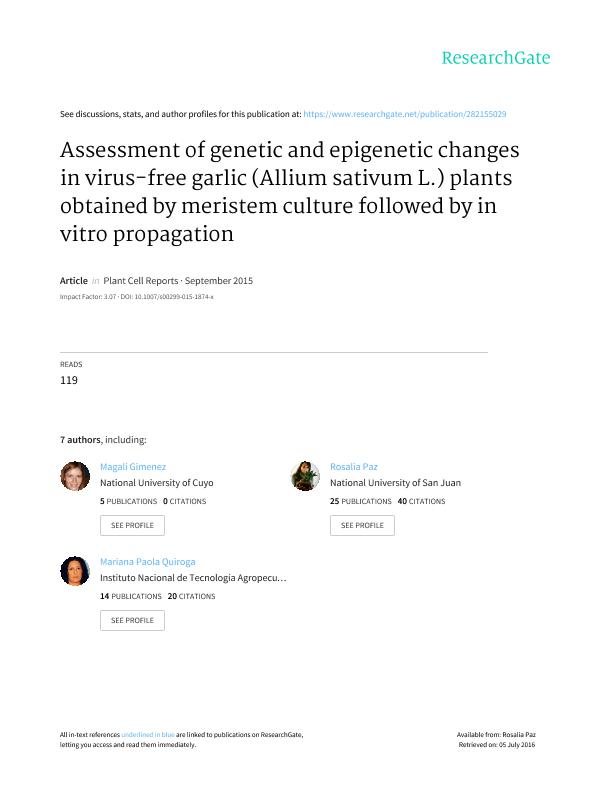Artículo
Assessment of genetic and epigenetic changes in virus-free garlic (Allium sativum L.) plants obtained by meristem culture followed by in vitro propagation
Giménez, Magalí Diana ; Yañez Santos, Anahi Mara
; Yañez Santos, Anahi Mara ; Paz, Rosalia Cristina
; Paz, Rosalia Cristina ; Quiroga, Mariana Paola; Marfil, Carlos Federico
; Quiroga, Mariana Paola; Marfil, Carlos Federico ; Conci, Vilma Cecilia
; Conci, Vilma Cecilia ; Garcia Lampasona, Sandra Claudia
; Garcia Lampasona, Sandra Claudia
 ; Yañez Santos, Anahi Mara
; Yañez Santos, Anahi Mara ; Paz, Rosalia Cristina
; Paz, Rosalia Cristina ; Quiroga, Mariana Paola; Marfil, Carlos Federico
; Quiroga, Mariana Paola; Marfil, Carlos Federico ; Conci, Vilma Cecilia
; Conci, Vilma Cecilia ; Garcia Lampasona, Sandra Claudia
; Garcia Lampasona, Sandra Claudia
Fecha de publicación:
01/2016
Editorial:
Springer
Revista:
Plant Cell Reports
ISSN:
0721-7714
Idioma:
Inglés
Tipo de recurso:
Artículo publicado
Clasificación temática:
Resumen
Key message: This is the first report assessing epigenetic variation in garlic. High genetic and epigenetic polymorphism during in vitro culture was detected. Sequencing of MSAP fragments revealed homology with ESTs. Abstract: Garlic (Allium sativum) is a worldwide crop of economic importance susceptible to viral infections that can cause significant yield losses. Meristem tissue culture is the most employed method to sanitize elite cultivars. Often the virus-free garlic plants obtained are multiplied in vitro (micro propagation). However, it was reported that micro-propagation frequently produces somaclonal variation at the phenotypic level, which is an undesirable trait when breeders are seeking to maintain varietal stability. We employed amplification fragment length polymorphism and methylation sensitive amplified polymorphism (MSAP) methodologies to assess genetic and epigenetic modifications in two culture systems: virus-free plants obtained by meristem culture followed by in vitro multiplication and field culture. Our results suggest that garlic exhibits genetic and epigenetic polymorphism under field growing conditions. However, during in vitro culture system both kinds of polymorphisms intensify indicating that this system induces somaclonal variation. Furthermore, while genetic changes accumulated along the time of in vitro culture, epigenetic polymorphism reached the major variation at 6 months and then stabilize, being demethylation and CG methylation the principal conversions. Cloning and sequencing differentially methylated MSAP fragments allowed us to identify coding and unknown sequences of A. sativum, including sequences belonging to LTR Gypsy retrotransposons. Together, our results highlight that main changes occur in the initial 6 months of micro propagation. For the best of our knowledge, this is the first report on epigenetic assessment in garlic.
Palabras clave:
Aflp
,
Msap
,
Msap Fragment Cloning
,
Retrotransposon
,
Somaclonal Variation
Archivos asociados
Licencia
Identificadores
Colecciones
Articulos(CIGEOBIO)
Articulos de CENTRO DE INVESTIGACIONES DE LA GEOSFERA Y BIOSFERA
Articulos de CENTRO DE INVESTIGACIONES DE LA GEOSFERA Y BIOSFERA
Articulos(IBAM)
Articulos de INST.DE BIOLOGIA AGRICOLA DE MENDOZA
Articulos de INST.DE BIOLOGIA AGRICOLA DE MENDOZA
Citación
Giménez, Magalí Diana; Yañez Santos, Anahi Mara; Paz, Rosalia Cristina; Quiroga, Mariana Paola; Marfil, Carlos Federico; et al.; Assessment of genetic and epigenetic changes in virus-free garlic (Allium sativum L.) plants obtained by meristem culture followed by in vitro propagation; Springer; Plant Cell Reports; 35; 1; 1-2016; 129-141
Compartir
Altmétricas



